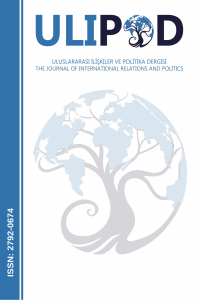Savunmacı Realizm Perspektifinden Soğuk Savaş Dönemi Almanya-İsrail İlişkileri ve İstihbarat Servislerinin İşbirliği
Almanya, İsrail, İstihbarat, Savunmacı Realizm, İşbirliği
from the Perspective of Defense Realism, Cold War German-Israel Relations and Cooperation of the Intelligence Services
Germany, Intelligence, Israel, Defensive Realism, Cooperation,
___
Adams, J. (2006). “Historical Dictionaries of Intelligence and Counter intelligence”, Scarecriw Pres, Cilt:4, No:11, s.489- 495. Asseburg, M. (2015). “Fifty Years of German-Israeli Diplomatic Relations”, German Institute for International and Security Affairs, Cilt: 27, s. 1-15. Balcı, A. (2005). “Avrupa Birliğinin Filistin Politikası”, Ali Balcı ve Kemal İnat (der). Ortadoğu Yıllığı 2005, Nobel Kitapevi, s.354-384. Balcı, A. ve Kardaş, Ş. (2017). Uluslararası İlişkilere Giriş. İstanbul, Küre Yayınları. Bar Zohar, M. ve Mishal, N. (2012). Mossad: Büyük Operasyonlar. İstanbul: Koton Kitap. Belkin, P. (2007). “Germany’s Relations with Israel: Background and Implications for German Middle East Policy”, Library of Congress Washington DC Congressional Research Service, January 19, 2007, s. 2-3 https://apps.dtic.mil/dtic/tr/fulltext/u2/a464690.pdf Erişim Tarihi: 29.04.2017 Brentjes, B. (2001). “Geheim operasyonu Nahost: zur Vorgeschichte der Zusammenarbeitvon Mossad und BND”, Das Neue Berlin, 2001. Bülbül, A. (2019). Başbakan Angele Merkel Dönemi Almanya’nın Ortadoğu Politikası. Yayınlanmış Yüksek Lisans Tezi. Erciyes Üniversitesi, Kayseri. Bülbül, A. (2020). “Asgari Egemenlik Azami İstihbarat: Soğuk Savaş’ta Federal Almanya Cumhuriyeti Dış İstihbarat Servisi’nin (BND) Ortadoğu’daki Faaliyetleri”,Erciyes Üniversitesi Sosyal Bilimler Enstitüsü Dergisi, Cilt:3, No: 50, s.330-346. Collins, A. (2017). Güvenlik Çalışmaları. İstanbul, Uluslararası İlişkiler Kütüphanesi. Çakı, C. Ali Gazi, M. ve Çakı, G. (2019). “Nazi Almanya’sı İşgalindeki Polonya’da Propaganda Posterleri Üzerinden Yahudilere Karşı Nefret Söylemi İnşası”, Araştırma Makalesi, Cilt:12, No:2, 2019, s. 785-786. Çakı, C. (2018). “Nazizm İdeolojisi Altında Hitler Gençliği: Nazi Almanya’sı Propaganda Afişleri Üzerine İnceleme”, Elektronik Cumhuriyet İletişim Dergisi, Cilt:1, No: 1, 2018, s.11-15. Erbe, P. ve Jürgen, P. (1997). “Handbuch Ausrüstung Bundeswehr”, Report Verlag, 1 Ocak 1997, s. 78 Erbe, P. Ve Preylowski,J. (1997). Handbuch Ausrüstung Bundeswehr. Report Verlag, 1997. Europa (2017). “Venice Declaration, June 13, 1980” http://eeas.europa.eu/archives/docs/mepp/docs/venice_declaration_1980_en.pdf, Erişim Tarihi: 13.06.2017. Gardner Feldman, L. (1984). The Special Relation ships Between West Germany and Israel. Allen:UnwinPty. Graf, R.(2014). Knowledge und Energie politik in den USA und West Europa in den 1970er Jahren. OldebourgVerlag. Gül Yesevi, Ç. (2014). “İsrail İstihbaratı ve Mossad,” Ümit Özdağ, İstihbarat Örgütleri, Ankara: Kripto Yayınları. Gül Yesevi, Ç. (2017). “İsrail ve Devlet İmajının Şekillenmesi”, Araştırma Makalesi, Cilt: 9, No:16, 2017, s.117-120. Kloke, M. (2005). “40 Jahredeutsch-israelische Beziehungen”, Bundeszentarlefürpolitische Bildung, 07.07.2005, http://www.bpb.de/25044/40-jahre-deutsch-israelische-beziehungen?p=all Erişim Tarihi: 05.06.2017 Lobell, S. (2010). “Structual Realism/ Offensive and Defense Realism”, 1 Mart 2010. MOSSAD (2016). “About us”, https://www.mossad.gov.il./eng/about/Pages/default.aspx, Erişim Tarihi: 23 Aralık 2016. Müller, P. ve Müller, M. (2002). Gegen Freund und Feind: Der BND: Geheime Politik und schutzigegeschafte. Rowohlt.
Nassauer, O. (1995). “An ArmySurplus- The NVA’s Heritage”, Bonn International Center for Conversion Research (BICC). https://www.bits.de/public/bicc95.htm. Erişim Tarihi: 3 Juna 1995. Nassauer, O. ve Steinmetz, C. (2003) “Rüstungs kooperationzwischen Deutschland und Israel”, BITS Resarch Report, September 2003, https://www.bits.de/public/researchreport/rr03-1-5.htm. Neuberger, B. (2005). “Israel und Deutschland: Emotionen, Realpolitik und Moral” , 04.04.2005 Seiler, B. (1996). “ Dolchstoß und Dolchstoßlegende, Zeitschriftfürdeutsche Sprache,”Hamburg, 1996, s.1-22 Shipiro, S. (2000). “Fürdie Sicherhe it Israels kooperierenwirsogar mit dem Teufel”, Magazin – Seite M6, https://ia800204.us.archive.org/17/items/NazisBndUndMossad/NazisBndUndMossad.pdf. Erişim Tarihi: 8 Ocak 2000. Shipiro, S. (2002). “Intelligence Service and ForeignPolicy: German –Israeli Intelligence and Military Cooperation”, German Politics, Cilt:11, No:1 2002, s. 23-42. Shipiro, S. (2005). “Für Israels Sicherheitpaktierenwirsogar mit dem Teufel”, http://www.todesnacht.com/raf/GSG9%20+%20Mossad/Coop%20BND%20Mossad,%20aufbau%20GSG9.pdf, Erişim Tarihi: 11 Nisan 2005. Shpiro, S. (2010). “Intelligence Services and Foreign Policy: German-Israeli Intelligence and Military Cooperation”, German Politics, Cilt:11, No:1, s.34-40. Shpiro, S. (2012). “Know Your Enemy: West German-Israeli Intelligence Evaluation of Soviet Weapon Systems”, Journal of Intelligence History, Cilt:4, No:1, s.57-59. https://doi.org/10.1080/16161262.2004.10555093. Tang, S. (2009). “The Security Dilemma: A Conceptual Analysis”, Security Studies, Cilt:18, No: 3 ss. 591-595. Waltz, K. (1979). Theory of International Politics. Massachussetts, Addison-Wesley Publishing Company. Weidnaz, R. “Casualties of Unification?:UnderstandingtheVariousInterpretations of the Dissolution of the Nationale Volksarmee and the Integration of Its Membersin to the Bundeswehr”, Florida State University Libraries”, s.120.
- Yayın Aralığı: Yılda 2 Sayı
- Başlangıç: 30.06.2021
- Yayıncı: Uluslararası İlişkiler ve Politika Derneği
